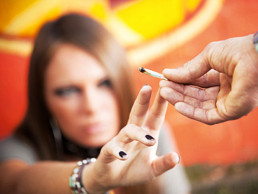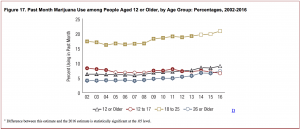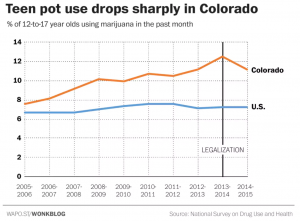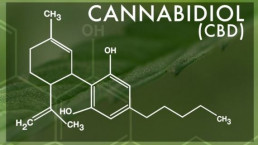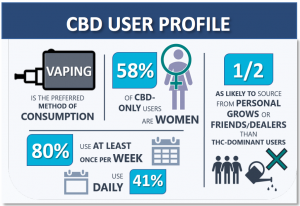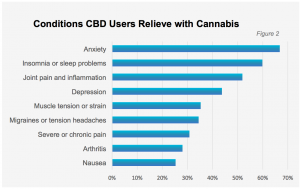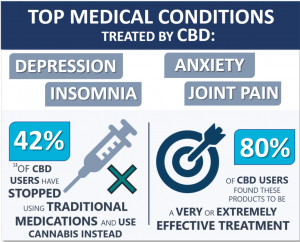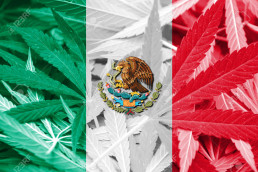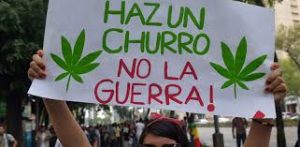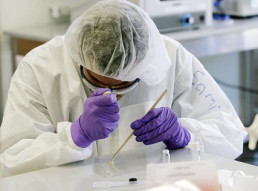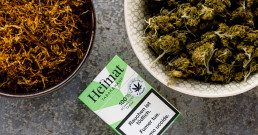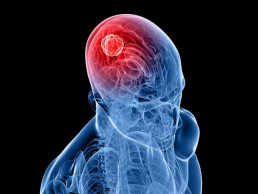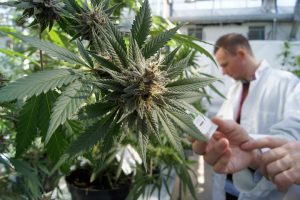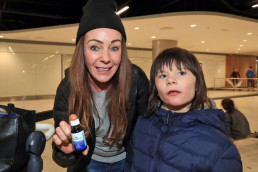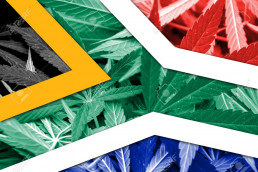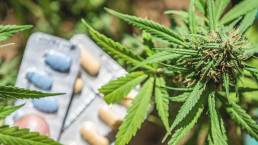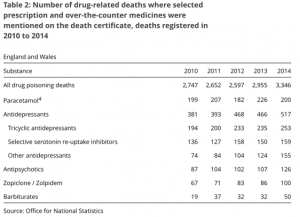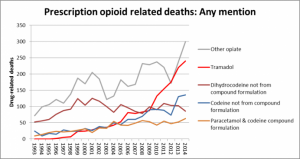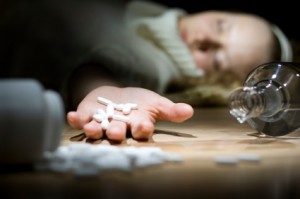New Study Finds Cannabis Reduces Chance of Obesity and Diabetes
New Study Finds Cannabis Reduces Chance of Obesity and Diabetes
- New research has found that rates of obesity and diabetes are a third lower in regular cannabis users than those who don’t use cannabis at all
- Despite consuming 600 more calories a day, regular cannabis users had lower BMI than non-cannabis users
- Could cannabis be the secret to staying thin?
A new study from researchers at the University of Nebraska may have just found that people who regularly consume cannabis are less likely to develop diseases related to poor physical health, such as obesity and diabetes.
Researchers studied over 4,600 adults (12% regular cannabis users, 42% previous cannabis users, 46% never consumed) to try to find out why cannabis users’ increased calorie intake doesn’t seem to be reflected in increased BMI.Each participant was tested for several control measures of blood sugar control: their insulin resistance, cholesterol levels, fasting insulin and glucose levels, and waist circumference.
Each participant was tested for several control measures of blood sugar control: their insulin resistance, cholesterol levels, fasting insulin and glucose levels, and waist circumference.
“Rates of obesity were lowered by a third in people who regularly consume cannabis than those who had never consumed…”
Researchers found that regular cannabis users’ waist circumferences were considerably smaller than those who had never used cannabis, cannabis users also had higher levels of “good cholesterol” (HDL).
Rates of obesity were lowered by roughly a third in people who regularly consume cannabis (three times a week); 22% of non-cannabis were obese, compared to just 14% of regular marijuana smokers.
Possibly the most significant difference between those who smoked marijuana and those who never did was that current smokers’ insulin resistance (where the body has trouble absorbing glucose from the bloodstream) was reduced by 17%, with their overall insulin level being reduced by 16%.
While the results of the study show cannabis users do have less chance of developing diabetes or becoming obese, researchers are still unsure as to why.
Cannabis’ anti-inflammatory properties, its neuroprotective effects, better metabolization of carbohydrates and endocannabinoid benefits were all noted as possible reasons for these findings, although further research will be needed to have a better understanding of why cannabis users are more resistant to diabetes and obesity, despite eating the infamous “munchies.”
References and further Reading
https://academic.oup.com/aje/article/174/8/929/155851/Obesity-and-Cannabis-Use-Results-From-2
https://www.ncbi.nlm.nih.gov/pubmed/1251930
Impact of legalisation: Cannabis legalisation lowers teenage use to 20-year low in America
Impact of legalisation: Cannabis legalisation lowers teenage use to 20-year low in America
- Teen use of cannabis has dropped to lowest level since 1994
- Adult use of recreational has increased
- Is legalisation the only way to prevent children from accessing cannabis?
New data from the most recent report on cannabis use amongst teenagers may have just debunked the argument that legalising cannabis will lead to more teenagers using the drug.
According to a new report by the federal Substance Abuse and Mental Health Services Administration (SAMHSA), use of cannabis by US teenagers fell in 2016 to its lowest since 1994.
The study found that the number of teenagers (12-17 year-olds) who had used cannabis in the “past-month” has gradually been decreasing since 2002. Now at 6.5%, down from 8.2% in 2002, the rate of teen use is down to its lowest level since 1994.
The report also discovered that consumption of cannabis by teenagers has been fallen every year post-2014, when adult recreational use of cannabis was first legalised by Colorado and Washington.
Vehement opponents of the legalisation of cannabis often use the fear of increased use in teenagers to justify keeping the medicinal plant criminalized, arguing that legalising cannabis sends a “wrong message” to teenagers, and that cannabis can be damaging to an adolescent mind.
“Our findings provide the strongest evidence to date that marijuana use by teenagers does not increase after a state legalises medical marijuana.”
– Dr. Deborah Hasin
However, there has been a significant number of studies to challenge this argument. A previous federal survey data showed that teen cannabis use fell dramatically in Colorado in between 2014 and 2015 following legalisation.
Another study, from Columbia University Medical Center, led by Dr. Deborah Hasin, also found that teen use of cannabis did not increase in States with legal access, in fact, rather the opposite:
“Our findings… suggest that passage of state medical marijuana laws does not increase adolescent use of marijuana.”
Discussing the results of her study with The Guardian, Dr. Hasin commented: “Our findings provide the strongest evidence to date that marijuana use by teenagers does not increase after a state legalises medical marijuana.”
Recreational cannabis use among adults, however, have significantly risen since legalisation, with the quickest growing consumption group being middle-aged and older adults. In 2016, 20.8% Americans between 18-25 used cannabis at least once a month: the highest since 1985.
This figure was only 14.5% for those aged 26-34.
What these surveys provide is a clear argument for legalisation of cannabis, both medicinally and recreationally. The facade of the “what about the children” argument has given way to hard facts: legalising cannabis lowers, not raises, use among teenagers.
References and further Reading
https://www.samhsa.gov/data/sites/default/files/NSDUH-FFR1-2016/NSDUH-FFR1-2016.htm#summary
Largest survey on CBD finds nearly half of users are able to stop taking traditional medications
Largest survey on CBD finds nearly half of users are able to stop taking traditional medications
- Survey found that 42% of new CBD users were able to stop taking pharmaceutical medicines
- 80% of respondents found CBD to be “very or extremely effective” in treating conditions
- 55% of respondents were female
- Can CBD become the UK’s main medicinal cannabis product?
Evidence from the largest ever survey on CBD is suggesting that an increasing number of medical patients are replacing traditional medications in favour of cannabidiol (CBD), the non-psychoactive compound found in cannabis.
In the largest study of its kind, jointly conducted by the Brightfield Group and HelloMD, the world’s largest online medical marijuana community, 2,400 of HelloMD’s 150,000 community members were surveyed on their usage, knowledge, perceptions, and misconceptions of CBD.
“Hopefully, access for [CBD] products will help patients… who cannot obtain medication that contains THC”
– Dr. Perry Solomon
Who is using CBD?
The survey differentiated between several control groups: those using Full Spectrum cannabis, either CBD or THC dominant; and those using CBD isolates.
The survey found that more women are currently using CBD-only products, with 58% of CBD-only users found to be women. However, this was the smallest group within the respondents: only 9% of respondents claimed to only use CBD products.
Why are people using CBD?
Cannabidiol (CBD) is one of the most prolific chemical compound found in cannabis, known for its use as a potential medicine, such as an anti-psychotic, neuroprotectant, anti-depressant or anti-inflammatory.
According to Dr. Perry Solomon, the Chief Medical Officer at HelloMD, the most common reasons people used CBD were neurological, for example, to treat insomnia, depression and anxiety, and for pain and inflammation also being heavily mentioned by respondents. An impressive 80% claimed they found products containing CBD to be “very or extremely effective.”
A further 52% of respondents indicated that their CBD products are either “more effective” or “much more effective” in relieving medical conditions than are prescription medications.
The survey found CBD to be so effective at treating some of these medical conditions, nearly half of the respondents (42%) claimed they were able to completely replace all of their traditional medications with the cannabis-derived medicine.
As we recently reported, people are already using illegal cannabis to help overcome their addictions to opioid-based medications.
What this data suggests is that people who are still addicted to dangerous prescription drugs, and are worried about the psychoactive effects or illegality of THC, may be able to turn to cannabis’ legal alternative: CBD isolates.
With Britain on the brink of an “opioid crisis,” could CBD be the answer?
Participants in the survey were asked which cannabinoid (THC/CBD) they would use to treat particular medical conditions. Perhaps surprisingly, more patients are using CBD-only/dominant products than those using THC.
For joint pain and inflammation, 54% of CBD only product users treat their joint pain/inflammation with cannabis, compared with 48% of THC dominant product users.
38% of CBD-dominant (full spectrum cannabis) users treat migraines with cannabis, versus 35% of hemp-derived CBD users and 34% of THC-dominant users.
For chronic and severe pain, CBD-dominant cannabis was favoured instead of THC-dominant cannabis: 32% of CBD dominant users turning to cannabis to treat their chronic pain, versus only 28% of THC-dominant users.
Interestingly, more people were found to use hemp-derived CBD than Full Spectrum to treat their arthritis: 31% of hemp-derived CBD users versus 28% of CBD-dominant users and 24% of THC-dominant product users.
The results from the survey could have wide-ranging implications for the growing CBD market in the UK.
With THC still illegal in the UK and CBD recently being reclassified as a medicine, patients in the UK are able to access legal cannabinoid-based medication.
Discussing the results of the survey, Dr. Perry Solomon said: “This landmark survey, in terms of its size and depth, shows the tremendous value that these products have for patients.
“Hopefully, access for products such as these will help patients all across the country who cannot obtain medication that contains THC.”
Have you been able to replace some, or all, of your medications with CBD products? We would love to share your success stories! Get in touch or comment below.
References and further Reading
Mexico legalises medical marijuana
Mexico legalises medical marijuana
- The bill signals the end of criminalising acts related to medicinal use of cannabis and allows scientific research on the plant
- THC is to remain highly regulated, with medical cannabis only being permitted to contain less than 1% THC
Mexico has just joined the ranks of countries allowing its citizens the human right of choice over their medicine by passing a bill legalising cannabis for medicinal purposes.
The bill passed back in April, receiving significant support from members of Congress, with an overwhelming 371 members of the Lower House of Congress voting in favour. Only 19 politicians voted against or abstained.
It also received popular support from the Mexican Senate in December, with 98 senators voting to pass the bill and seven voting against.
“I welcome the approval of the therapeutic use of cannabis in Mexico.”
– Dr. José Narro Robles (Mexico’s Secretary of Health)
The ruling eliminates the prohibition and criminalisation of acts related to the medicinal use of marijuana and its scientific research.
The law authorises the Ministry of Health to create new regulations for medical marijuana use, as well as “how to regulate the research and national production of them.”
Currently, only cannabis that is 1% or less THC (the psychoactive cannabinoid) will be permitted. The Ministry of Health will be required to study the medicinal and therapeutic effects of cannabis before creating the framework for a medical marijuana program infrastructure.
Recreational cannabis remains explicitly illegal. Signed by Mexico’s President, Peña Nieto, the bill signals a clear push to end prohibition of cannabis in the country.

This isn’t the President’s first attempt at reducing the cost of policing cannabis in Mexico. In 2016 Nieto tried to pass a bill which would have allowed citizens to carry up to an ounce on them without fear of legal repercussions, but the bill stalled in the Senate.
His latest attempt, The Medical Marijuana Bill, however, sailed through the Senate with ease in December 2016, passing through Mexico’s lower house in parliament in April with a vote of 347-7 in favour of approval.
Voicing his support for the measure, Mexico’s Secretary of Health, Dr. José Narro Robles, said: “I welcome the approval of the therapeutic use of cannabis in Mexico.”
With more and more countries legalising cannabis for medicinal purposes, is it now time for the UK to end its war on science and compassion? Let us know in the comments below!
Cannabinoids in combination with chemotherapy found "most effective" at killing cancer cells
Cannabinoids in combination with chemotherapy found “most effective” at killing cancer cells
- New research confirms that cannabinoids can be effective in killing leukaemia cells, particularly in combination with chemotherapy
- The study also found that cannabinoids are most effective when used after chemo treatment
- It also confirmed that cannabinoids possess anticancer properties on their own
St. George’s University of London may have just proven that cannabis can be effective in treating certain types of cancer.
Researchers tested whether existing chemotherapy treatments worked effectively alongside the cannabinoids and whether using the drugs in a different order had an effect. What they found may revolutionise the role of medicinal cannabis in British society.
The study, led by Dr. Wai Lu, “confirmed that cannabinoids are effective in killing leukemia cells, particularly when used in combination with chemotherapy treatments.”
Researchers found that “Phytocannabinoids possess anticancer activity when used alone, and a number have also been shown to combine favourably with each other in vitro in leukaemia cells to generate improved activity.”
However, cannabinoids are not enough on their own to fully fight leukemia cells. They are most effective when after an initial dose of chemotherapy:
“The most efficacious cannabinoid-pairs subsequently synergised further when combined with the chemotherapy agents, and were also able to sensitise leukaemia cells to their cytotoxic effects.”
Researchers also found that cannabinoids are most effective when used after an initial round of chemotherapy, significantly improving overall results against blood cancer cells.
They also discovered that combining cannabinoids with existing chemotherapy treatments has a better result than with just chemotherapy alone, meaning that a similar level of effect could be achieved by using a lower dose of the chemotherapy. “Researchers found that cannabinoids are most effective when used after an initial round of chemotherapy…” St. George’s claim that if this were translated to humans, “this lower dose of chemotherapy would mean that the side-effects of chemotherapy could be lessened.”
Dr. Wai Liu said: “We have shown for the first time that the order in which cannabinoids and chemotherapy are used is crucial in determining the overall effectiveness of this treatment.”
Smoking cannabis, however, will not have a similar effect: “These extracts are highly concentrated and purified, so smoking marijuana will not have a similar effect.
“But cannabinoids are a very exciting prospect in oncology, and studies such as ours serve to establish the best ways that they should be used to maximize a therapeutic effect.”
Cannabinoids are the active chemicals in cannabis, known more specifically as phytocannabinoids. When extracted from the plant and purified, they have been shown to possess anticancer properties, especially in certain cancers of the brain.
What could this mean for British medicine? Going off the study’s conclusions, it’s hard to imagine a future without cannabinoids being central to our health system. 4,584 people died from Leukemia in the UK in 2015. If we have the potential to save their lives, is it not our duty as a compassionate society to reclassify cannabis away from Schedule 1 status so more research can be done and more people can be saved?
Let us know your thoughts on the study’s findings in the comments!
References and further Reading
https://www.sgul.ac.uk/news/news-archive/cannabinoids-used-in-sequence-with-chemotherapy-are-a-more-effective-treatment-for-cancer
Supermarkets in Switzerland start selling CBD cigarettes
Supermarkets in Switzerland start selling CBD cigarettes
- Swiss tobacco company launches world’s first legal cannabis-tobacco cigarette product
- Cannabis was decriminalized in Switzerland in 2012
- Around 500,000 people consume cannabis in Switzerland per year
- Annual sales of legal cannabis reach around 100 million francs
- Could this be the future of CBD products?
The world’s first legal “tobacco-hemp cigarettes” have gone on sale in Swiss supermarkets.
Containing 20% CBD and less than 1% THC, the new CBD cigarettes will be legal to smoke anywhere you could normally smoke in Switzerland, or indeed, in any country which has legalised CBD.
Switzerland decriminalized cannabis in 2012, but retained a blanket ban on THC, explaining why the new cigarettes’ THC contents must contain less than 1% THC.
Costing 19.90 Francs, the cigarettes will not get you high due to their low-level of THC. However, due to the cannabidiol (CBD) content, the cigarettes will contain medicinal cannabinoids, but with the addition of tobacco, the cigarettes can hardly be classified as a “health product”.
Created by independent Swiss tobacco company, Heimat, the cigarettes will be legally available in any Coop supermarket in Switzerland.
Switzerland decriminalized cannabis in 2012, allowing the Swiss public to carry small quantities of low-THC cannabis.
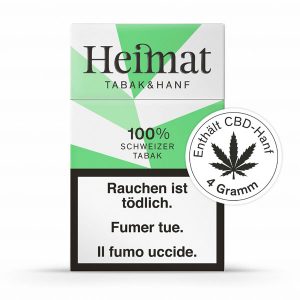 Since 28 September 2012, the possession of fewer than 10 grams of cannabis is no longer a criminal infringement. The amount of cannabis in each Heimat packet is around 4 grams, meaning smokers have nothing to fear carrying them around in their pockets.
Since 28 September 2012, the possession of fewer than 10 grams of cannabis is no longer a criminal infringement. The amount of cannabis in each Heimat packet is around 4 grams, meaning smokers have nothing to fear carrying them around in their pockets.
Decriminalisation has proved popular among Swiss citizens, with around 6.5% of the population (500,000) regularly consuming the drug, spending just over $100,000,000 a year on the medicinal herb and related products.
While there are places, especially in cities like Amsterdam and Barcelona, to purchase ‘pre-rolled’ joints, Heimat’s will be the “first and only cigarette containing cannabis that is sold in a regular supermarket.” Could this be the future of CBD products?
Still containing tobacco, the cigarettes’ medicinal benefits, even with 20% hemp CBD, will be limited, especially as many who consume CBD for medicinal purposes choose to use other methods, such as tinctures or vapourisers, over smoking it directly.
Tobacco is one of the greatest issues facing the European cannabis community. Despite 6 million people worldwide dying from tobacco use, 78% of Europeans use tobacco with their cannabis compared to only 4.4% of Americans.
Using tobacco with cannabis can be extremely dangerous, smoking 3-4 cannabis joints with tobacco a day causes roughly the same damage as smoking 20 normal cigarettes a day.
CBD products have already proven popular in the Swiss supermarket, with a Coop spokesperson claiming that hemp-based products, such as tea, beer, and oil, “are in high demand.”
Heimat’s cost £20 and can be purchased from their official website. Will you be trying some?
New study finds no link between cannabis and psychosis
New study finds no link between cannabis and psychosis
- Research from the U.K., Ireland and Denmark may have debunked one of the strongest arguments against cannabis
- The study found no increased risk for psychosis in cannabis users who abstain from other “drug use”
A new study, published in Drugs and Alcohol Today, has claimed that there is no increased risk for psychosis for those who only use cannabis.
The study sought to examine the association between recreational drug use and psychotic disorders, e.g. cannabis use and psychosis. However, this study uniquely looked into the relationship between cannabis use and psychosis, whilst examining this relationship within a “polydrug” context, i.e. combining cannabis with other drugs – such as tobacco, alcohol or cocaine. The research team, made up of seven researchers from the U.K., Denmark and Ireland, analysed self-reported measures of lifetime drug use among 4,718 Danish 24-year-olds. The participants’ reports were linked to the Danish psychiatric registry system which was utilized as an objective mental health status indicator.
What the researchers found may finally debunk the “cannabis causes psychosis” argument, which is often used to justify keeping it illegal:
“Compared with no drug use, the use of cannabis only did not increase the risk of psychosis while the odds ratio for cannabis and other drug were statistically significant.”
If cannabis use, on its own, does not cause psychosis, will the British Government be forced to legalise, as the apparent link between cannabis use and psychosis seems to be the only strong argument for maintaining prohibition?
Billy’s story: How one young boy from Ireland is removing the stigma surrounding medical cannabis
Billy’s story: How one young boy from Ireland is removing the stigma surrounding medical cannabis
- Billy Caldwell, a young boy from Ireland, made history earlier this year by becoming the first person to be prescribed cannabis oil on the NHS.
- The company which made the oil, 710 Pharmaceuticals MNE, then decided to name their CBD oil “Billy’s Bud.”
The story of a young, 11-year-old Irish lad’s battle with severe epilepsy has captured the imagination of the nation, bringing the issue of medical cannabis to the national attention. His mother, Charlotte, told MMJ she “couldn’t be happier,” of what he has achieved in such a short time, under such difficult circumstances.
The family of two from Castlederg, a small town bordering both Ireland and Northern Ireland, have battled impossible odds to be where they are today: 256 days seizure free and launching a new campaign to help lower income families get access to medical marijuana.
Billy suffers from both intractable epilepsy, meaning he cannot be treated with traditional pharmaceutical medication or with a change in diet like some epileptics, coupled with severe autism. Facing up to a thousand seizures a week, the young Northern Irish lad’s mother, Charlotte, ran out of traditional options to help her suffering child. That’s where medical cannabis came in.
 After travelling to America to see a specialist consultant, Charlotte was referred to a medical marijuana specialist, completely changing her and Billy’s life. Charlotte told us how the family first came to try medical cannabis:
After travelling to America to see a specialist consultant, Charlotte was referred to a medical marijuana specialist, completely changing her and Billy’s life. Charlotte told us how the family first came to try medical cannabis:
“We didn’t actively set out to search for cannabis oil, I just wanted to stop the seizures, which had become uncontrollable. Billy was suffering from up to 100 seizures a day at this point.
“We couldn’t access any treatment in the UK, so I took Billy to LA where a specialist paediatric doctor referred him to a medical cannabis doctor. That was actually our first contact with cannabis.”
Asked whether she was doubtful about the recommendation to try a drug which the British Government views as having ‘no medicinal value,’ Charlotte explained:
“I wasn’t sceptical, no. But when you have to watch your child suffer that amount of seizures a day, and when someone tells you they have a solution, you have to at least try it!”
Billy’s epilepsy immediately began to improve. The life-threatening seizures decreased in number.
“It was truly amazing, and he is continuing to fight the condition, with the help of cannabis,” Charlotte told, us, explaining how medical cannabis has helped her son.
“There’s been so many improvements. He’s now able to make eye contact, retain his balance, he’s walking better, getting up and down stairs, but most importantly, he’s seizure free! It’s been 256 days since his last one!
“I was recently able to buy Billy normal shoes for the first time, instead of his specialist boots. It’s the small things, which you may take for granted, which are huge milestones for us.”
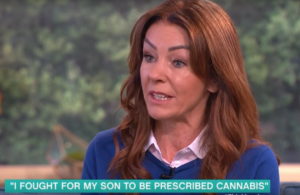
Unfortunately, staying in America, away from your family and friends takes its toll, both financially and emotionally. The family was forced back to Ireland:
“We were completely on our own, away from our family. We were in LA for 8 months on the medical cannabis programme; micro-dosing, low doses of cannabis throughout the day, But the cost of staying in LA was too much, so had to find a way home.”
When one door closes, another opens. Being forced to return to Ireland, in turn, forced Charlotte to find a doctor in Ireland who would help, paving the way for history to be made. After contacting their local GP, Dr Brendan O’Hare, Billy became the first person to be prescribed CBD oil on the NHS.
The cannabis oil which Billy is prescribed, via the NHS, contains no THC, the psychoactive cannabinoid which is still banned within the British Isles, with a concentration of isolated CBD, a legal cannabinoid which has already proven to have several significant medicinal properties.
This single prescription may hold the potential to change the future of medical cannabis in the UK, at least in the way the British, both the public and politicians, view the drug’s potential medical value. While cannabinoid-based medications already exist in the UK and are available on the NHS, in the form of Sativex (a cannabinoid tincture used for pain, particularly for MS), a patient has never been prescribed CBD oil before.

Cannabidiol (CBD) products were legalised and reclassified for medicinal late last year, leading to a boom in the CBD market. Clearly, the alternative medicine is already proving popular, so much so, that Forbes reported that the CBD market will grow to a $2.1 billion market in consumer sales by 2020.
To attribute the blooming national success of CBD products in the UK to one young boy in Northern Ireland could be viewed as grandiose, but Billy has certainly had a significant impact on how the Irish and British view cannabis when used for medicinal purposes.
Success stories, like Billy’s and Callie and Deryn Blackwell’s, show the public just how powerful and life-changing cannabis can be as a medicine. They prove to the public that cannabis is not just the drug of “lazy stoners” (despite a recent study finding cannabis use actually improves cognitive function). Simply put, Billy and his mother are helping to remove the dangerous stigma attached to medical marijuana.
Charlotte told us how the public reaction to the family’s heroic story had received had been more than positive:
“There’s been no bad reaction at all.
“In fact, people have been stopping me in street, middle aged people, young, old, all kinds, all talking about CBD!
“Billy’s story has really changed peoples thinking on cannabis, he’s removing the stigma. He’s become an advocate for cannabis, on both sides, both recreational and medicinal.
“He’s only 11, but he’s inspired so many people already, I’m so proud of him! I’m Utterly privileged that he chose me to be his mummy! The journey has been incredible!” Billy’s journey has undoubtedly attracted national attention and affection. The wee lad from a small town in Northern Ireland, conquering 1,000s of life-threatening seizures, the first to be prescribed CBD oil on the NHS, and now the mascot of Billy’s Bud – the CBD oil available on the NHS prescription named after the heroic young boy who rose above all challenges to be where he is today.
After 710 Holdings, the Irish/American pharmaceutical company which supplies Billy his oil, visited the family back in Ireland, the two paired up to launch a fantastic new campaign to get CBD products to lower income families who could benefit from it, but cannot afford the often costly price.
Charlotte explained the inspiration behind the new ‘Sponsor a Bud’ campaign:
“As a single mum of a child with special needs, I fully understand and appreciate the cost of CBD. For someone on a lower income, it can be very difficult to afford, this is especially hard when you know in your heart that a family member could benefit from CBD.
“The campaign is about helping these families who need access but simply cannot afford it; so we’re going to fund them! We can potentially help some of these families for free!
“It shouldn’t make a difference how rich or poor you are. You should be able to at least see if CBD can help your family.”

Charlotte explained that the campaign, led by 710 and herself and Billy have already helped several families across Europe:
“From one post on Facebook I received 100s of emails and messages asking for help, all seeing if they could benefit from CBD.
“We’re already helping several families; in Scotland, Wales, London, South Dublin, Belfast, Lisbon… it’s crazy the response we’ve already had! We raised nearly £800 on the first day of the campaign alone.”
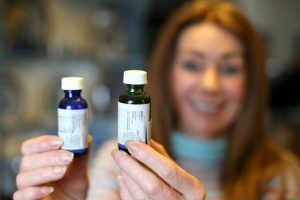
The cannabis community is one of the driving forces behind the legalisation movement; cannabis activists going out of their way to help those in need, helping people access medicinal cannabis. It’s this community ethos which Charlotte is relying on for the campaign to be a success:
“We can offer one free bottle for families to try, to see if it works. But we cannot, unfortunately, provide them with a lifetime supply.
“We’re asking local communities what they can do to help, that’s why we’re asking people to donate. We are trying to encourage people to band together to help these families continue their CBD treatments.”
The CBD oil itself is sourced from different strains of medical cannabis, not hemp, and will contain no THC, meaning it can be legally purchased in the UK and online.

Charlotte’s journey with Billy has solidified her belief that cannabis should be legalised within the UK. The heroic Northern Irish mother, however, views something other than the pharmaceutical industry or politicians as the largest block to the legalisation process with Britain:
“The greatest threat to legalisation is not the big pharmaceutical companies, the problem is that our medical professionals have not been trained on medical cannabis, on the science behind it, how it works, or even how to dose it.
“That is the key to this. If they [medical professionals] knew, if they knew just how life-changing cannabis can be…
“We need to train our doctors, we do not need a change in the law, just doctors and patients working together can make the change.
“710 Holdings is trying to get some of our doctors to visit Las Vegas to receive training on a medicinal cannabis course.”
“The only way this will work is if we discuss it openly and honestly. More people are using cannabis and CBD, more doctors are beginning to see results.
“I truly believe there will be more and more doctors coming forward in the near future.”
Charlotte left us with this powerful testament to why cannabis and CBD is so important to her and Billy:
“To everyone in Ireland and the UK, CBD has given me my right back as a mummy to hope; most importantly it’s given my little boy his right to life.”
Billy’s journey can be followed via his official Facebook page, and you can donate to the fantastic cause via their official Just Giving page.
South Africa Legalises Cannabis for Recreational Use
South Africa Legalises Cannabis for Recreational Use
- South Africa’s Western Cape High Court ruled that Cannabis prohibition in South Africa is “unconstitutional”
- 260,000 people were arrested for cannabis in South Africa last year
- The State can still appeal the decision
- Medical marijuana was legalised in February
Adults now have the right to use, possess and grow cannabis in the privacy of their homes following a landmark decision from South Africa’s highest court.
All three judges of the Western Cape High Court unanimously ruled in April that laws regarding cannabis prohibition in South Africa are unconstitutional, giving the government 24 months to amend the law in favour of cannabis legalisation.

Criminalized in 1908 under the “Criminal Prohibition of Dagga Act,” South Africa prohibited the possession, use and growth of cannabis. This new ruling will undo over 100 years of injustice.
Over 13% of all South Africa’s arrests in 2016 (260,000 people) involved cannabis. Hundreds of thousands of people stand to benefit from the High Court’s intervention.
There is still confusion surrounding the ruling, as police can still arrest a person for possession, with public use remaining illegal. Essentially, the new ruling only provides a “defence to a charge”; meaning you can still be arrested for possessing the medical herb, but it is unlikely you will be charged.
There is also a lack of clarity concerning the details of a legal distribution and retail network were not included in this ruling. Distribution remains illegal, meaning the only legal way to acquire cannabis is by growing your own, which could be problematic for those who have neither the time or space to grow.
It is unclear how the South African government will respond to the High Court’s ruling. Parliament in the African state retains the right to veto, although it is unlikely they will be able to overturn the ruling by the High Court. Here is part of their official response:
“Parliament is in the process of obtaining the judgment to study exactly what it says.
If the two laws mentioned have been found to be unconstitutional, then the Constitutional Court would have to confirm the judgment before Parliament can act. The state could also appeal the judgment.”
The Government has two years to present an official response to the ruling.
References and further Reading
Is Medical Cannabis the Answer to Britain's Growing Pharmaceutical Drug Crisis?
Is Medical Cannabis the Answer to Britain’s Growing Pharmaceutical Drug Crisis?
- Thousands of people overdose on pharmaceutical prescription drugs every year in the UK
- 1,195 people overdosed on legal pharmaceutical drugs in 2014
- A leading pathologist recently called for prescription painkiller Tramadol to be upgraded to a Class A following hundreds of deaths relating to the drug
- Thousands of patients worldwide have been replacing Tramadol and other prescription drugs with medical cannabis
Thousands of people are being prescribed pharmaceutical medications in the UK every year, leading to fatal addictions.
The Office for National Statistics (ONS) found from its research that there is an “underlying pattern” of increasing deaths in which an opioid pain medicine (OPM), especially tramadol, is mentioned. Does the UK have a growing problem with opioids? Can medicinal cannabis be the answer?
A study from the University of Victoria, Canada, last year found that people are increasingly ditching their prescription medications with medical marijuana, suggesting that cannabis can offer a potentially safer alternative to deadly, highly-addictive, pharmaceutical drugs.
Following an influx of deaths related to Tramadol, the most popular painkiller in the UK, leading pathologist, Professor Jack Crane, made calls for the British Government to upgrade Tramadol to a Class A.
Thousands of people in the U.K. take fatal doses of prescription drugs every year. According to the ONS, there were 3,674 drug poisoning deaths involving legal and illegal drugs in 2015. Of these, 1,195 (33%) exclusively involved legal drugs, while illegal drugs were involved in the remaining 67%.
After Diazepam, Tramadol is the leading legal drug people are overdosing on in the UK. According to the ONS, 240 people died from a fatal Tramadol overdose in 2014, with 258 dying from fatal doses of Diazepam (latest available figures).
Over half (53%) of all drug-related deaths in 2014 related to drug poisoning involving an opiate drug, but this does include heroin.
Opiates are having such a negative impact on British society that Harry Shapiro, head of addiction charity DrugWise, has said Britain is currently in the middle of a “public health disaster.”
Without addressing the serious issue opioids pose, Britain could follow the same path America has taken. In the USA, opioids (including prescription opioids and heroin) killed more than 33,000 people in 2015. Of these deaths, nearly half of all opioid overdose deaths involve a prescription opioid.
Can cannabis be the answer to Britain’s growing legal drug crisis? While opioids are killing thousands, every year, cannabis has not killed a single person, ever.
Research has already shown that patients addicted to prescription and opioid-based drugs are able to use cannabis as a “harm reduction role in the context of use,” of alcohol, illicit drugs, and prescription drugs.
We decided to speak to real medical patients addicted to prescription drugs to find out if cannabis has the potential to treat the symptoms people use prescription pharmaceutical drugs for, and if they had been able to replace the dangerous prescription drug with a safer alternative.
Hundreds of people in the U.K. are finding success with cannabis-based treatment for the same symptoms doctors prescribe dangerous, addictive, pharmaceutical drugs.
One of the major reasons people seem to be turning to medical marijuana, opposed to pharmaceuticals, is the debilitating side-effects that often come with them.
Thomas, who suffers from Porphyria and Mesenteric Lymphadenitis, had been prescribed a cocktail of Tramadol, Dihydrocodeine, Oxycodone, Oramorph, Morphine Sulphate, Fentanyl, Diazepam (Valium) and Naproxen.
Thomas explained that he began treating his symptoms with cannabis as the pharmaceuticals left him “like a zombie night and day,” to the point where he “didn’t have a life.”
After Thomas decided to start using medical cannabis, his life completely changed: “Without cannabis, I wouldn’t have a life and I wouldn’t be able to be a dad to my beautiful daughter.”
It’s given me my life back.
This was a common response. Pharmaceuticals have been robbing people of their identity, as another medical cannabis patient, Amanda, who found herself addicted to prescription drugs following a traumatic event in her childhood, explained.
After surviving parental-rape, Amanda was sent into a “spiral of depression” after the birth of her second child:” The birth was so painful it brought back the memories of the trauma, having bad flashbacks etc. I hated myself so badly to the point I started self-harming.”
Like many patients suffering from PTSD and depression, Amanda was prescribed Diazepam (Valium), which gave her short-term relief. Long-term, however, the drug left Amanda feeling worse than before, leading her to be prescribed even more drugs: “it drove me more mental ill! I was put on Temazepam, Chlorpromazine, Sodium valproate and Quetiapine.”
The drugs left Amanda “numb,” exacerbating the symptoms she was trying to initially relieve:
“I was so numb that I couldn’t relate to anything. I had no emotion or motherly connection for my kids, no expression on my face. It was like my whole body was numb and I was screaming on the inside for help.
“I was suffering severe PTSD at this point. I tried to commit suicide and I even found myself hanging off a bridge.
“I didn’t want to die, I just felt I couldn’t cope with the mental abuse inside my head. I had no words for conversation. It’s quite hard to explain, to be honest.”
Amanda was able to wean herself off this toxic cocktail of drugs using cannabis. Having smoked it since 14, Amanda only realised the plant’s true medicinal value when she began to use it in a medical capacity:
“I carried on smoking weed and weaned myself off most of the meds. I got my kids back and that alone changed so much!
“Eight years later and I’m still smoking weed and only rely on one tablet (when needed) but I much prefer a joint!
“If I didn’t have weed in my life back then, I know for sure I wouldn’t be here!” I would recommend medical cannabis to anyone!
A common side-effect patients report about antidepressant drugs is, ironically, depression and suicidal thoughts. Drew was prescribed Seraltrine, Diazepam, Zopiclone, Quetiapine, Naproxen, Zapain, and Sertraline for his mental illnesses, including anxiety, depression and OCD.
Rather than treat Drew’s depression, the drugs intensified the symptoms. Cannabis, however, provided unparalleled relief: “I can’t stand the side-effects of the Quetiapine, Zapain or the Diazepam. I was so sleepy all the time and it messed with my head.
“With the cannabis, I get none of that!
“I can wake up suicidal, but once I medicate with cannabis my mood totally changes to more positive thoughts. It also helps me deal with my pain a lot more.
“I’ve managed to stop the Zapain, Diazepam and Quetiapine and only take 100 mg of Seraltrine.”
According to David Mericle, a senior U.S. economist at Goldman Sachs, the opioid crisis has become so severe in America that it may be negatively affecting the American economy, potentially costing the American economy $78.5bn a year.
According to Mericle, Americans addicted to prescription drugs are actively not looking for jobs; not only because of the numerous side-effects mentioned above but also because those applying for jobs are failing their drug tests.
Before his crippling arthritis forced him into a hip operation, Chester had been a productive worker, putting in 12-hour shifts a day. Following the operation, Chester was prescribed Tramadol, Gabapentin, Sertraline and Co-codamol, leaving him unable to return to work:
“I’ve worked all my life, 12 hours a day for the last 12 years. I’d never even taken prescription drugs until last year when I was forced to have a hip operation through ostio-arthritis.
“After the first operation, there was just pain, leading me to be prescribed several pharmaceutical drugs.
The last 11 months on the prescription drugs has totally destroyed my life.
“Since being on the tablets I don’t sleep, I don’t eat, I wake up every day with no energy, and have more or less been a ‘sofa-cabbage’ for the last 11 months.”
Due to the side-effects of the prescription drugs, Chester was unable to return to work. Cannabis, however, has provided him with hope that he may one day be able to get back to a normal, working life:
“After a bit of research, I decided to stop taking these prescribed drugs and just smoking cannabis.
“After 2 months of no tablets, and just smoking cannabis, I’ve put 2 stone back on. I’ve been waking up with more energy! I’m slowly getting better.”
Leanna’s work life was also “destroyed” after she prescribed Tramadol, Pregabalin, Sertraline and morphine for Fibromyalgia and ME, leaving her “in constant pain.”
It must be remembered that cannabis is still an illegal substance, often preventing potential patients from accessing it, as Leanna explained: “I have used cannabis for a long time now. Mostly I smoke it at night to help my muscles relax and help me sleep.
“I don’t smoke it every night as it depends if I have any. But, I know when I’ve not got any how much I will struggle.
“I had a good life and a career before FMS took over me in 1998. Now it’s a constant round of medication, pain, sleep, exhaustion and everything else that goes with it.”
Due to cannabis’ Schedule I and Class B status, it can be difficult for patients to obtain the illegal drug, often forcing them to fund the black market trade, which inevitably funds violent organised crime.
Drew explained that he one of the main reasons he wants cannabis to be legalised for medicinal uses is the unreliability of the black market: “Buying from the black market is not good for people, as you haven’t a clue what you are getting!”
While some patients are forced into funding organised crime, others, who are able, choose to grow their own, like Harry, who uses cannabis to treat depression after he found that the numerous pharmaceutical drugs he was prescribed were not working:
“I’ve suffered from depression since my early 20s, I’m 48 now, and tried numerous pharmaceutical drugs. Some helped some didn’t.
“I started smoking cannabis and it really seemed to help the situation, so I decided to start growing my own.
“I didn’t need any anti-depressants and managed to hold down the same job for 13 years.”
While funding organised crime may be a serious concern for medical patients, the risk of loss of personal freedom can be greater, as Harry explained:
“On Halloween, 2012 I received the dreaded knock. I got busted for growing. They destroyed the whole lot, took away my medication.
“I then started to become stressed, anxious, etc. and ended back at the doctors. I’m now back on the drugs they supply and, unfortunately, I’m no longer able to work.”
If cannabis can help these people successfully treat the same symptoms which doctors and GPs are prescribing deadly pharmaceutical drugs for; does that alone not prove that cannabis has medicinal value? If so, it only follows basic logic that it must be immediately removed from the Schedule I classification, meaning it has “no medicinal value.”
If we do not address the growing pharmaceutical drug crisis growing in the U.K., we could end up with a situation similar to American states which do not have legal cannabis. The fact that the hospitalization rate for opioid abuse and dependence in states with medical marijuana are roughly 23% lower than states without legal access, shows just how effective legalising medicinal cannabis can be.
Have you had negative experiences with pharmaceutical drugs? Have you been able to replace these with medical marijuana? Let us know in the comments!
References and further Reading


